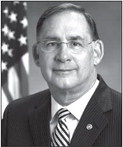Celebrating Arkansans who paved the way for equality

Celebrating Arkansans who paved the way for equality
Arkansans have a long history of creating change to make the world better. As we recognize Black History Month, itʼs important to share the work and dedication of those who were instrumental in breaking down barriers and fighting for equality. These Arkansas heroes recently passed away, but made an enormous difference in our state and nation by pursuing their dreams and challenging the status quo during their lifetimes.
Milton Pitts Crenchaw paved the way for integration in the United States military and influenced generations of aviators as a member of the Tuskegee Airmen. This Little Rock native had the distinction of being one of the original supervising squadron commanders for the Tuskegee Airmen, training hundreds of cadets during the 1940s, and helping break barriers in the military. His passion for aviation continued after his tenure at Tuskegee, serving as a flight instructor at several air bases, including Camp Rucker, Alabama, where he became the first black flight instructor.
Crenchaw honorably served with the U.S. Army Air Corps and the U.S. Air Force for more than 40 years and was instrumental in creating an aviation program at Philander Smith College in Little Rock.
Civil rights activist Ozell Sutton was a Gould native who helped lead the fight for desegregation in the Natural State and throughout the South alongside Dr.
Martin Luther King Jr. and other civil rights leaders.
Sutton earned a degree in political science from Philander Smith College. As the Arkansas Democratʼs first black journalist, he made a difference in how the newspaper covered the African-American community.
Sutton also served as a decoy at Central High School in 1957 when the Little Rock Nine integrated the school and was attacked after the mob figured out he was a decoy.
Sutton led integration efforts in Arkansas as assistant director of the Arkansas Council on Human Relations from 1961 to 1966. He joined the historic march on Washington and marched for voting rights in Selma, Alabama.
Following the death of Dr.
King, he served Governor Winthrop Rockefeller as the director of the Governor's Council on Human Resources from 1968 to 1970, and continued his public service with the U.S. Department of Justice Community Relations Services. He served as the Director of the Southeast Region from 1972 until his retirement in 2003. In addition to his lifelong work for civil rights, Sutton is also remembered as one of the first African-Americans to serve in the United States Marine Corps.
After the U.S. Supreme Court ruled on Brown vs.
Board of Education, schools in the south were slow to abide by the courtʼs decision. However, former Senator Dale Bumpers, who was a small-town layer in Charleston, encouraged the Charleston School Board to comply with the ruling, making it the first school district in the South to desegregate its schools. He was also credited with providing opportunities for African-Americans in state government during his time as the Governor of Arkansas.
We can and should be proud of the role these Arkansans played in shaping our nation. Recognizing their efforts to achieve equality is important as we continue to advance equal rights for all people.

From U.S. Senator John Boozman

